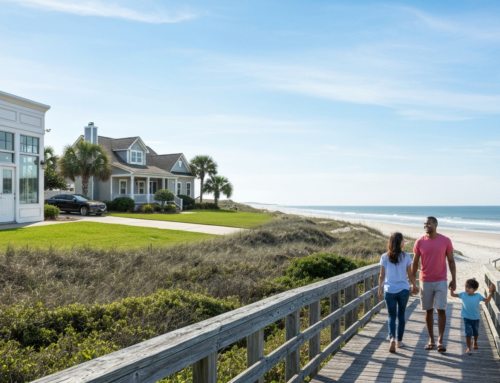Understanding Homeowners Insurance: More Than Just Coverage
Homeowners insurance is a critical safeguard for your most valuable asset, protecting against unforeseen damages and liabilities. However, many homeowners mistakenly believe their policy covers every eventuality. A deeper understanding reveals that all policies come with specific limitations, known as common homeowners insurance exclusions. Knowing these exclusions is paramount to ensuring your home and finances are truly protected.
At Beach Insurance LLC, we believe that informed homeowners are empowered homeowners. This guide will walk you through typical exclusions, explain why they exist, and provide strategies to bridge potential coverage gaps, ensuring you have the comprehensive protection you need.
What Are Homeowners Insurance Exclusions and Why Do They Exist?
Homeowners insurance exclusions are specific perils or types of damage that your standard policy will explicitly not cover. These exclusions are a fundamental aspect of how insurance policies are structured, and they serve several key purposes:
- Risk Management for Insurers: Certain risks are deemed too costly, too widespread, or too unpredictable for standard policies. Events like widespread flooding or earthquakes can cause catastrophic damage across vast areas, making them financially unsustainable for a single standard policy to cover.
- Preventable Damage: Insurers typically exclude damage that is preventable through routine maintenance or caused by neglect. Home insurance is designed for sudden and accidental losses, not for the gradual deterioration of a property or issues arising from a homeowner’s failure to maintain their home.
- Specialized Coverage: Some risks are so unique or high-value that they require separate, specialized policies or endorsements. This allows homeowners to customize their coverage based on their specific needs and regional risks without driving up the cost of standard policies for everyone.
Understanding these underlying reasons helps clarify that exclusions aren’t arbitrary; they are a necessary component of balancing comprehensive coverage with affordable premiums.
Common Homeowners Insurance Exclusions Explained
While policy specifics can vary, several exclusions are nearly universal across standard homeowners insurance policies (typically HO-3, the most common type). Familiarity with these can prevent unpleasant surprises during a claim.
- Floods: Damage from floods, including overflowing rivers, storm surge, or heavy rainfall, is almost always excluded. Flood insurance must be purchased separately, often through the National Flood Insurance Program (NFIP) or private insurers.
- Earthquakes and Earth Movement: Similar to floods, damage from earthquakes, landslides, and sinkholes is typically not covered by standard policies. Separate earthquake insurance or a “difference in conditions” policy is usually required.
- Mold: Mold damage is generally excluded unless it results from a sudden and accidental covered peril, such as a burst pipe. Mold that develops due to long-term leaks or poor ventilation is usually considered a maintenance issue.
- Wear and Tear/Neglect: Standard policies are not home warranties. Damage resulting from a lack of maintenance, aging components, or gradual deterioration (e.g., a slowly leaking pipe causing water damage over time) is excluded.
- Pest Infestations: Damage caused by termites, rodents, insects, or other vermin is typically excluded, as infestations are often considered preventable with proper home upkeep.
- Intentional Damage/Loss: Any damage caused intentionally by the homeowner or a household member to file a claim will be denied and can lead to charges of insurance fraud.
- War, Nuclear Hazard, Government Action: Losses due to acts of war, nuclear radiation, or government confiscation or destruction of property are excluded due to their catastrophic and uninsurable nature.
- Specific Wind Damage in High-Risk Areas: In hurricane-prone coastal states, wind damage from named storms or hurricanes may have a separate, higher percentage-based deductible, or may even be excluded and require a separate windstorm policy. For example, understanding your hurricane deductible is crucial for coastal residents.
Detailed Look at Specific Home Exclusions You Should Know
Beyond the primary exclusions, homeowners should also be aware of more nuanced coverage limitations that can lead to significant out-of-pocket expenses if overlooked.
Water Damage Beyond Flooding
While floods are excluded, other forms of water damage can also present gaps:
- Sewer Backup and Sump Pump Overflow: Damage caused by water backing up from sewers or drains, or by a sump pump failure, is generally excluded. This often requires a specific endorsement.
- Groundwater Seepage: Water seeping into your basement or foundation from the ground is typically not covered.
Business-Related Losses
If you operate a business from your home, your standard homeowners policy offers very limited protection:
- Home-Based Businesses: Property used for business purposes and business-related liability are usually not covered. A separate business owner’s policy or a home business endorsement is often necessary, especially if clients visit your home.
High-Value Personal Property
While personal property is covered up to a certain percentage of your dwelling limit, there are often sub-limits for specific high-value items:
- Jewelry, Furs, Silverware, Artwork: Standard policies typically cap reimbursement for these items at amounts like $1,000 to $2,500 if stolen. For full value protection against various perils (including mysterious disappearance), a scheduled personal property endorsement (also known as a “floater”) is recommended.
Liability for Certain Dog Breeds or Activities
Liability coverage can also have exclusions:
- Aggressive Dogs: Some insurers may exclude coverage for damage or injuries caused by dog breeds considered aggressive (e.g., pit bulls, Rottweilers). Others may deny coverage based on a dog’s bite history.
- High-Risk Recreational Structures: Features like trampolines and swimming pools can increase liability risk. Some policies may exclude them entirely or require additional liability coverage.
Other Exclusions
- Power Surges: Damage to electronics from external power surges (e.g., utility company issues) may be excluded, though lightning-induced surges are generally covered.
- Local Building Ordinance or Law: If your damaged home needs to be rebuilt to current building codes that are stricter or more expensive than when it was originally constructed, standard policies may not cover the additional costs. An “ordinance or law” endorsement can help cover these expenses.
Strategies to Close Coverage Gaps and Enhance Your Protection
Understanding common homeowners insurance exclusions is the first step; the next is proactively addressing them to protect your investment. Beach Insurance LLC emphasizes a multi-pronged approach:
- Thorough Policy Review: “Read your home insurance policy thoroughly. You don’t want to find out too late that a problem isn’t covered,” advises NerdWallet. If you identify any coverage gaps, discuss them with your insurer.
- Purchase Endorsements (Riders/Add-ons): Many exclusions can be covered by adding an endorsement to your existing policy for an additional premium. Common endorsements include:
- Flood insurance (separate policy)
- Earthquake insurance (can be an endorsement or separate policy)
- Sewer backup and sump pump overflow coverage
- Scheduled personal property endorsements for high-value items
- Home business endorsements for business property and liability
- Ordinance or Law coverage for increased rebuilding costs due to updated codes
- Maintain Your Property Diligently: Many exclusions, particularly for mold, pests, and gradual water damage, stem from a lack of maintenance. Regular inspections and timely repairs can prevent these issues from arising. This proactive approach not only protects your home but can also make you a more attractive policyholder.
- Consider an Umbrella Liability Policy: For broader liability protection beyond what your homeowners policy offers, an umbrella liability policy is an excellent option. It provides additional coverage above the limits of your home and auto insurance, shielding your assets in the event of a significant lawsuit.
Navigating Your Policy with Beach Insurance LLC: Expert Guidance for Your Home
At Beach Insurance LLC, we understand that deciphering insurance policies can be complex. Our commitment is to provide clear, actionable guidance to help you navigate the intricacies of homeowners insurance, particularly concerning common homeowners insurance exclusions. We serve clients across North and South Carolina, offering personalized solutions that address the unique risks faced by homeowners in our region.
Our experienced agents take the time to explain your coverage options, identify potential gaps, and recommend suitable endorsements or specialized policies. We ensure you understand the difference between named perils and open perils, and the implications of actual cash value versus replacement cost, empowering you to make informed decisions about your home’s protection. Your home is a significant investment, and partnering with a knowledgeable insurance provider is essential to safeguard it effectively.
Don’t Be Caught Unprepared: Proactive Steps for Comprehensive Home Protection
The key to comprehensive home protection lies in proactive engagement with your insurance policy. Don’t wait until a disaster strikes to discover that your coverage falls short. Here are vital steps you can take:
- Conduct a Home Inventory: Create a detailed list or video record of your possessions. This is invaluable for determining adequate personal property coverage and for expediting claims.
- Understand Your Policy Limits and Deductibles: Review your declarations page annually. Ensure your dwelling coverage reflects the actual cost to rebuild your home, not its market value. Be clear on your standard and any specialized deductibles (like hurricane deductibles).
- Stay Informed About Local Risks: Be aware of natural disaster risks in your area. If you live in a coastal or earthquake-prone region, actively seek information on specialized coverage. “As climate change leads to more severe weather events, it can be costly not to have weather-related endorsements on your policy,” notes U.S. News.
- Communicate with Your Insurance Professional: Your Beach Insurance LLC agent is a valuable resource. Discuss any home renovations, new valuable purchases, or changes to your household (e.g., acquiring a new pet) to ensure your policy remains up-to-date. Regularly reviewing your personal insurance needs can help adapt coverage as your life evolves.
By taking these proactive steps, you can significantly reduce your exposure to uninsured losses and gain peace of mind, knowing your home is protected against a wide array of perils, even those typically considered common homeowners insurance exclusions.
Ready to ensure your home is fully protected against common exclusions? Contact Beach Insurance LLC today to review your policy and bridge any coverage gaps.






